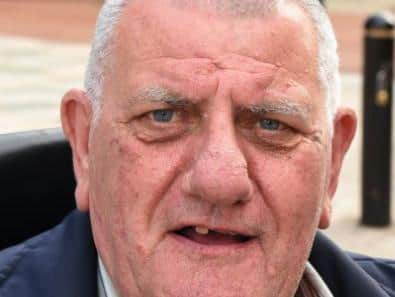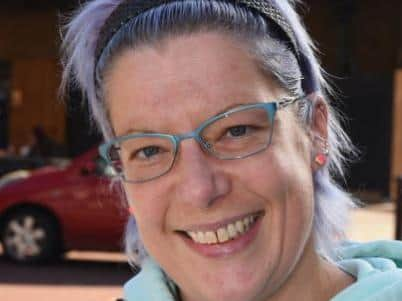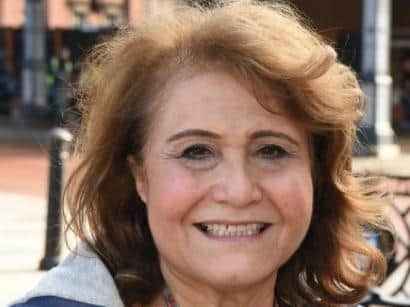Would we be seen by a doctor?: City weighs-in on pandemic's impact on emergency services
and live on Freeview channel 276
And although a majority of our readers asked did say that the emergency services and schools were coping well under the circumstances, a proportion of them - almost a quarter - said the quality of provision at schools is ‘not good’ currently.
Hundreds of Lancashire Post readers took part in our recent Big Conversation poll and had their say on the pandemic, its effects and their future hopes and fears.
Advertisement
Hide AdAdvertisement
Hide AdReaders also expressed concerns over the quality of care being provided by the National Health Service, with some saying they feared they wouldn’t be given a doctors appointment or would feel they were wasting resources if they were to speak to a doctor.


Retired Alan Armstrong, 67, from the Grange, was quick to comment front line workers for their fight during the pandemic.
He said: “Front line workers have done an excellent job and have put up with all sorts, and now we have to do our bit.
“The government should up their wages because they deserve it for all their hard work.
Advertisement
Hide AdAdvertisement
Hide Ad“Younger people will suffer with mental issues as well as older people. Different communities deal with the pandemic in different ways and there are people working non stop to help in their communities.


“The government have never been in this predicament before and I haven’t seen anything like this in my time. We all have a part to play in it, the government now need to put time into sorting it out both in hospitals and in education.”
Law student at UCLan, Callum Newman, 22, lives in the City centre. He said: “In terms of the hospitals and the emergency services it is obvious they are certainly struggling under pressure.
“I think they are doing their best to keep up as best they can under the current circumstances. It doesn’t help if people aren’t careful or are using the health service for silly reasons.
Advertisement
Hide AdAdvertisement
Hide Ad“People are definitely down in the dumps, if family members can’t visit eachother from different areas, or you can’t see your friends, then anyone would suffer. In a community, people need people.”


The findings of the Lancashire Post's Big Conversation poll are examined and analysed, to give an insight into the way Prestonians are coping with this once-in-a-lifetime crisis.
Health services in England have altered in order to prepare and cope with the rapid rise in Covid-19 cases seen across the country and in Preston - and the urgent and emergency care system has been put to the test.
The total number of Covid patients in Lancashire and South Cumbria’s hospitals has now surpassed the peak of the first wave – and more than half of critical care beds in the region are currently occupied by people suffering from the virus.
Advertisement
Hide AdAdvertisement
Hide AdA source told the Post that just over one in every two beds allocated to “critical care” in the region – those located in high dependency and intensive care units – is now filled by the most seriously ill Covid patients.


Responding to a request for comment about the latest figures, an ICS spokesperson said: “We have seen significant increases in Covid-19 admissions and NHS services in Lancashire and South Cumbria are under a huge amount of pressure.
“We want to emphasise that all hospitals within Lancashire and South Cumbria are working together and have plans in place to manage increased demand on our services. All hospitals are following strict social distancing and hygiene measures.
David Davies, 65, lives in Fulwood with his disabled wife. He said: “The emergency services, hospitals and schools have coped very well under the circumstances. We rely on them and regularly need to ring for an ambulance because of my wife.
Advertisement
Hide AdAdvertisement
Hide Ad“They can’t give the same quality of care as before the pandemic, but they try their best. The experience has been totally different, people are given basic care at the minute because they don’t have the facilities or the time to go the extra yard.
“The pandemic has affected people’s sense of community and their mental health. It has affected me, I have come to town today just for a walk to get out because it is so boring in the house. There are so many people like me who are struggling, and the help isn’t there for them because of stretches on the services.
“I rang the doctors up over 10 days ago and still haven’t heard back.”


Anna Thornhill, a 41-year-old secretary from Penwortham, said: “At the minute, if Iwant to ring the doctor for me or my children, I tend not to because I know they are not going to see me.
Advertisement
Hide AdAdvertisement
Hide Ad“My children’s school has done really well in adapting and have closed classes when there was the odd case. They have adapted really well and I feel it is a safe environment for them to be in, definitely.
“Long term I also think that will have a negative effect on people’s mental health. I am a friendly person but nobody wants to talk because they are too scared to speak to anybody.
Susana Gonzales, 72, originally from Chile, has lived in Preston for 45 years. Her husband, also 72, has continued to work as a neurologist throughout the pandemic in north Manchester.
She added: “The emergency services have been terribly affected. The waiting lists are so high, I know coronavirus is urgent, but there are other illnesses that people need desperate care for who may die because of the situation facing our health service.
Advertisement
Hide AdAdvertisement
Hide Ad“The NHS need to find a balance and way to help others with other illnesses because it is a catastrophe at the moment in the hospitals.
“People are more separated than ever before in my community, they are all so frightened of the virus.
“Mental health effects of the virus have also put a strain on the system. It is terrible and, is not only for the older generations, but the young people are also struggling too because they like to go out and socialise more than anyone.”
The Lancashire Post is more reliant than ever on you taking out a digital subscription to support our journalism. For unlimited access to Lancashire news and information online, you can subscribe here: lep.co.uk/subscriptions
Comment Guidelines
National World encourages reader discussion on our stories. User feedback, insights and back-and-forth exchanges add a rich layer of context to reporting. Please review our Community Guidelines before commenting.